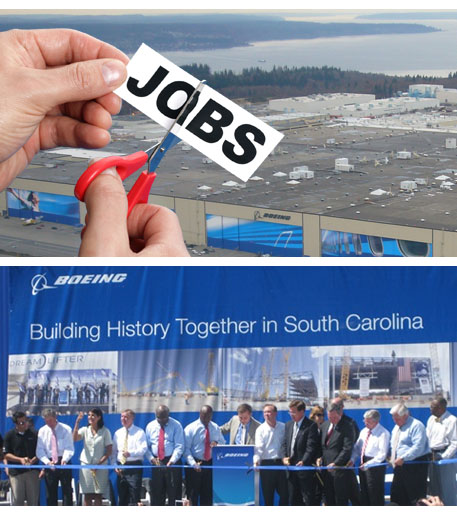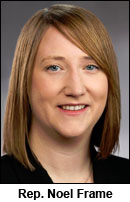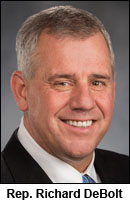STATE GOVERNMENT
Amid Boeing job cuts, legislators eye tax break accountability
OLYMPIA (May 3, 2017) — The extended special session to approve the state budget has given Washington state legislators a chance to reconsider bills that weren’t approved during the regular session. On Tuesday, the House Finance Committee heard two bipartisan labor-supported bills that would add accountability measures to the state’s lucrative aerospace tax incentives.
 Since 2013, when the State Legislature and The Boeing Co. agreed to extend an estimated $8.7 billion in tax incentives, instead of increasing employment in the state as our Legislature intended and the public expected, Boeing has cut nearly 13,000 jobs in Washington — more than 7,000 in the past year alone — with more cuts planned later this year. Meanwhile, Boeing is sparing its manufacturing sites in other states from similar job cuts, and even expanding employment elsewhere.
Since 2013, when the State Legislature and The Boeing Co. agreed to extend an estimated $8.7 billion in tax incentives, instead of increasing employment in the state as our Legislature intended and the public expected, Boeing has cut nearly 13,000 jobs in Washington — more than 7,000 in the past year alone — with more cuts planned later this year. Meanwhile, Boeing is sparing its manufacturing sites in other states from similar job cuts, and even expanding employment elsewhere.
“My colleagues and I don’t understand why the company is offloading significant work from the Puget Sound area,” Boeing engineer Mark Friesen testified at Tuesday’s hearing. “I’m in favor of tax incentives, but I’m also in favor of good jobs.”
HB 2145 and HB 2146 have support from dozens of members of their respective caucuses. Both titled the Aerospace Tax Incentive Accountability Act, the bills would amend the aerospace tax incentives — which have already been amended several times since they were enacted in 2003 — to add job conditions resembling those required in other states in order for Boeing to receive tax incentives.
At Tuesday’s hearing, current and recently displaced Boeing employees who support the bills were joined by parents and schoolchildren concerned about school funding, and advocates for good government and equitable tax policies. But for the unions that represent Boeing employees — Machinists (IAM) District Lodge 751 and the Society of Professional Engineering Employees in Aerospace SPEEA/IFPTE 2001 — testimony focused on the thousands of jobs cut by Boeing while the company continues to receive its full tax breaks.
IAM 751 Legislative Director Larry Brown reminded lawmakers that his union strongly supported the aerospace tax incentive extension, but since that time the company has cut almost 13,000 jobs. If you consider the multiplier effect, that’s 36,000 lost jobs, more than the population of Wenatchee.
 Boeing officials, corporate lobbyists and two port commissioners defended the ongoing tax incentives and the company’s investment in Washington state. Those who mentioned the job cuts blamed the industry’s competitive pressures, but none explained why the layoffs are so heavily focused in Washington state. In other states, those competitive pressures are resulting in few job reductions or none at all. In fact, legislators heard testimony that local jobs are being shifted to other states.
Boeing officials, corporate lobbyists and two port commissioners defended the ongoing tax incentives and the company’s investment in Washington state. Those who mentioned the job cuts blamed the industry’s competitive pressures, but none explained why the layoffs are so heavily focused in Washington state. In other states, those competitive pressures are resulting in few job reductions or none at all. In fact, legislators heard testimony that local jobs are being shifted to other states.
Jason Chan is a former Boeing wingline mechanic in Renton who now works for IAM 751 to review work transfers from Boeing and to advocate for solutions to keep the jobs in-house. He told the committee that he has watched as Boeing jobs have been shifted to Oregon, Texas, Utah, Missouri, Arizona and South Carolina, as well as Korea, Japan, Mexico and China.
“I spoke with Senator Mark Miloscia (R-Federal Way) about tax incentive accountability and his response was: ‘A deal is a deal’,” Chan said. “I think most people in this room would agree with that — unless you break that deal. When we violate a company policy or our contract, there are repercussions. That’s Boeing’s recourse. When Boeing violates the intent of the incentive extension to grow and maintain aerospace jobs, where is our recourse? That’s why there needs to be tax incentive accountability.”
HB 2145 , sponsored by Rep. Noel Frame (D-Seattle), would reduce Boeing’s tax credit by half if the company’s employment in Washington drops below 70,000 jobs. The company gets no tax credit and pays the standard tax rate all other manufacturers pay if its employment drops below 67,500 jobs. Boeing currently employs 71,036 Washington workers, down from 83,295 in November 2013. Aerospace tax credits would remain in place if the job loss is due to a nationwide industry downturn.
, sponsored by Rep. Noel Frame (D-Seattle), would reduce Boeing’s tax credit by half if the company’s employment in Washington drops below 70,000 jobs. The company gets no tax credit and pays the standard tax rate all other manufacturers pay if its employment drops below 67,500 jobs. Boeing currently employs 71,036 Washington workers, down from 83,295 in November 2013. Aerospace tax credits would remain in place if the job loss is due to a nationwide industry downturn.
 HB 2146, sponsored by Rep. Richard DeBolt (R-Chehalis), would assess Boeing employment levels in 2024, the year the original aerospace tax incentive begins its extension. If Boeing’s average employment in Washington is less than 75,000 during the period of 2017-2024, Boeing’s tax incentives would expire.
HB 2146, sponsored by Rep. Richard DeBolt (R-Chehalis), would assess Boeing employment levels in 2024, the year the original aerospace tax incentive begins its extension. If Boeing’s average employment in Washington is less than 75,000 during the period of 2017-2024, Boeing’s tax incentives would expire.
The Washington State Labor Council, AFL-CIO joins IAM 751 and SPEEA in strongly urging the House Finance Committee to advance these proposals that brings needed accountability to Washington’s aerospace tax preferences.
Watch Tuesday’s hearing on TVW:





